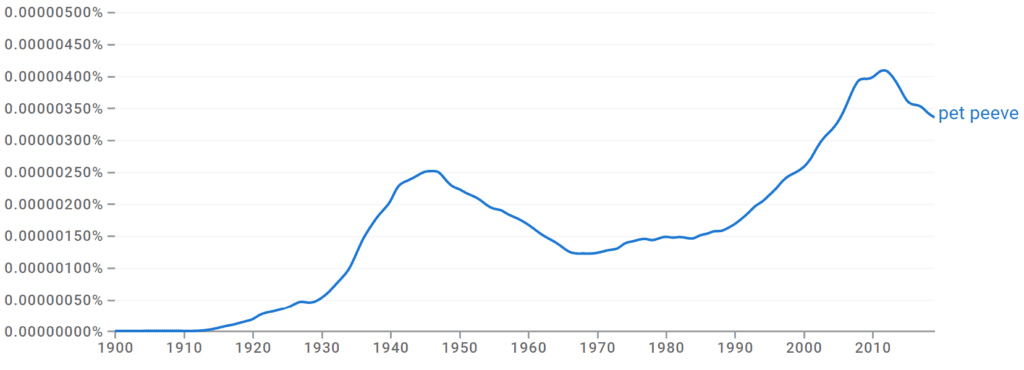Many people use the term pet peeve without actually understanding what it means. If you are using it to explain a general, accepted annoyance, then chances are you have it wrong. Most people overuse the term rather than receive it for the individualized occurrence it is supposed to refer to.
Pet peeves are personal in their use and not widely recognized by large populations of people. For example, being annoyed at a dog that barks all night wouldn’t be a pet peeve since almost everyone would be annoyed. But, a person who finds any dog bark in general annoying may be said to have a pet peeve.
Let’s take a closer look at what this term means, where it came from, and how you can use it properly in your own work.
What Is the Meaning of a Pet Peeve?

A pet peeve is something one finds extremely annoying. In order to be defined as a pet peeve, the annoyance needs to be a particular thing that a person finds to be obnoxious, which doesn’t usually bother other people.
Pet peeves are something that most people are not at all bothered by or something that is only considered a very minor annoyance. Yet, to the person it bothers, it will likely drive them to distraction, and they often react with an anger that is out of proportion to the transgression.
Using Pet Peeve in Sentences
Let’s take a look at how to properly use pet peeve in a sentence.
- Her pet peeve made her miserable; she hated being able to hear anyone breathing, making her hypersensitive and often cranky when in the presence of others.
- People’s geographical ignorance has become a huge pet peeve of mine. It’s absolutely maddening when people are stupid enough to think I come from a different country because I live in New Mexico.
- He never thought he had any pet peeves since he was such an easygoing person. However, he seriously found himself getting enraged by the lack of vehicular turn-signal use he was experiencing in the new town he had moved to.
What Is the Origin of Pet Peeve?

Pet peeve came into use in the early 20th century from the combination of the word pet, meaning “an especially cherished thing,” and the word peeve, meaning “irritated or exasperated.” Peeve is derived from a late 14th-century word peyvesshe, meaning “perverse or capricious,” likely originating from the Latin perversus. However, this original use was already being replaced with an alternative meaning to be “cross or ill-tempered” by the early 16th century.
Let’s Review
A pet peeve is something that an individual finds extremely annoying despite it not being very bothersome to others. Usually, a pet peeve makes a person irrationally upset as it is personal in nature and usually plays upon their nerves or emotions.
The term came into use in the early 1900s as a play upon the word peeve, meaning to be irritated.
